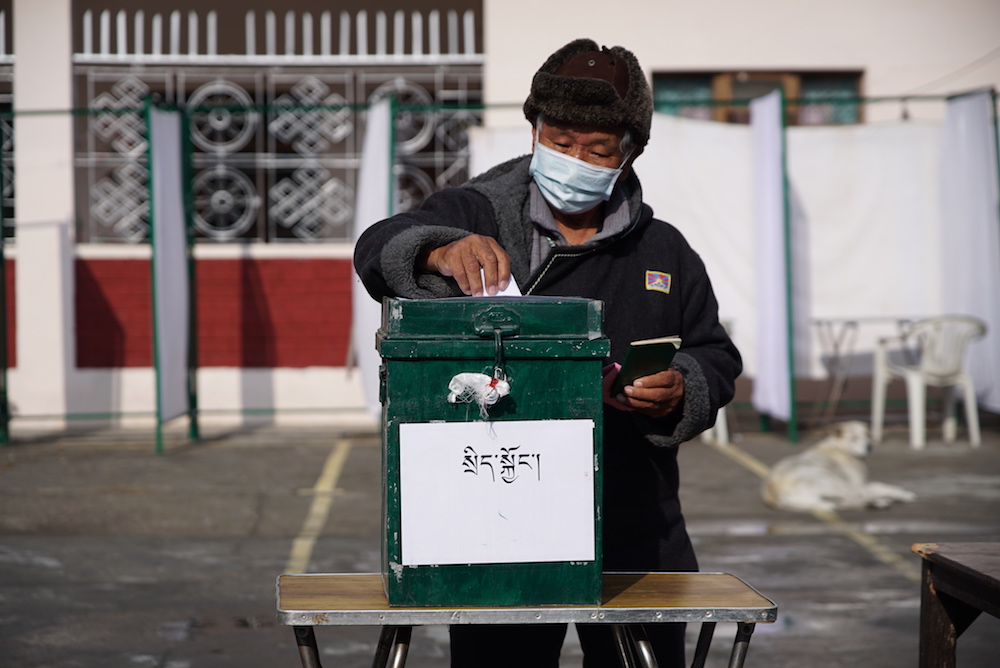Tibetan elections held worldwide in January have thrown up two candidates, Penpa Tsering and Aukatsang Kelsang Dorjee, as the finalists in the first round of polls. Results of these elections will lead to the formation of the Central Tibetan Administration (CTA) – the Dharamsala-based Tibetan Government in Exile (TGE).
Radio Free Asia (RFA) reported Preliminary vote counts confirmed by RFA show former speaker of Tibet’s exile parliament Penpa Tsering in first place with 23,687 votes, followed by Aukatsang Kelsang Dorjee, former representative of Tibet’s exiled spiritual leader the Dalai Lama, with 13,754 votes.”
Tibetan news websites, ‘Phayul‘ and ‘Tibet Sun‘ have uploaded the election results in great detail, highlighting the votes cast in each constituency across the world.
Tens of thousands of Tibetans from all the main continents had participated in the preliminary round of voting held on January 3, 2021. The second round of voting, scheduled for April 11 will decide the winner along with members of the 17th Tibetan Parliament in Exile (TPiE).
Gyari Dolma, former CTA home minister and the first woman to run for the office of Sikyong, is in the third spot with 13,126 votes. Drongchung Ngodup, representative of the Dalai Lama in New Delhi, is at the fourth spot with 9,742 votes.
Lobsang Sangay, Harvard-trained law scholar is the current Sikyong and has served two consecutive five-year terms in that position. He will relinquish his post on the expiry of his term in May 2021.
The CAT, which was formed in 1959 soon after the Dalai Lama fled Tibet on annexation by China, has executive, judiciary, and legislative branches. It has been holding elections since 2011 by popular vote. The Tibetan elections are held as an example of democratic traditions followed by the exiled Tibetan diaspora in India and other countries in opposition to the closed communist rule in China.
The elections follow a landmark US Congress law, the Tibet Policy and Support Act (TPSA) that calls for providing support to the Tibetan government and the people in their struggle against China. The US law, passed in December 2020, says that decisions regarding the reincarnation of the Dalai Lama lie only with him, the Tibetan Buddhist leaders and the Tibetan people.
In a statement, the US State Department said: “Tibetan Buddhists wherever they reside should be allowed to select, educate, and venerate the future Dalai Lama and other religious leaders without PRC officials’ interference.”
The law makes it an offence for Chinese officials to interfere in the selection process of a successor to the Dalai Lama and has put penalties on officials for doing so. Under outgoing US President Donald Trump, the administration is going all out to support Tibetans in their struggle for independence. This year, the humanitarian arm of the US – the USAID has also started providing funds to the CTA.
Under pressure on many fronts, China has warned Washington and also India to not interfere in the internal affairs of China, particularly related to the independence for Tibet.
Despite China’s intransigent stand, the Dalai Lama has advocated a peaceful path – the Middle Way, which accepts Tibet’s present status as a part of China but urges greater linguistic, cultural and religious freedom for Tibetans. The two sides held nine rounds of talks on greater autonomy in Tibetan areas from 2002 to 2010 without any conclusion.
There has been increased focus on Tibet owing to imposition of electronic surveillance, coercive labor practices and increasing Sinicization.




















